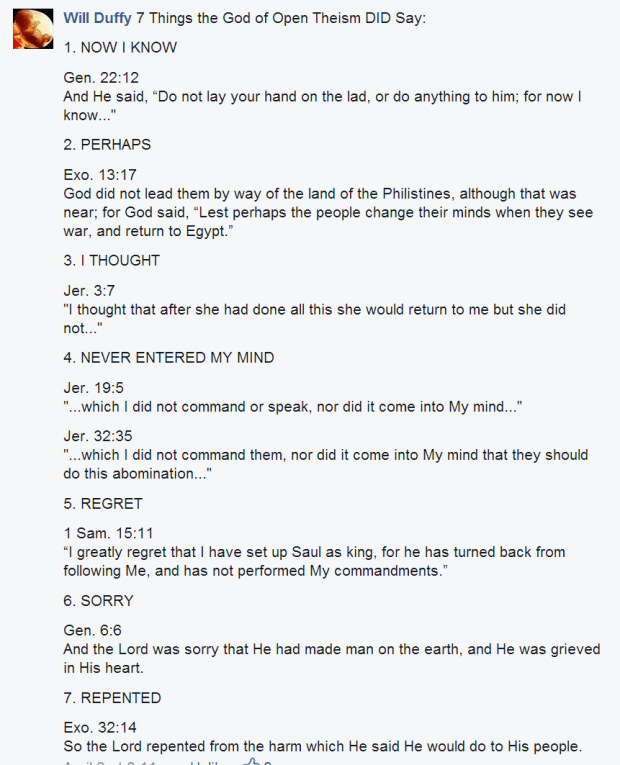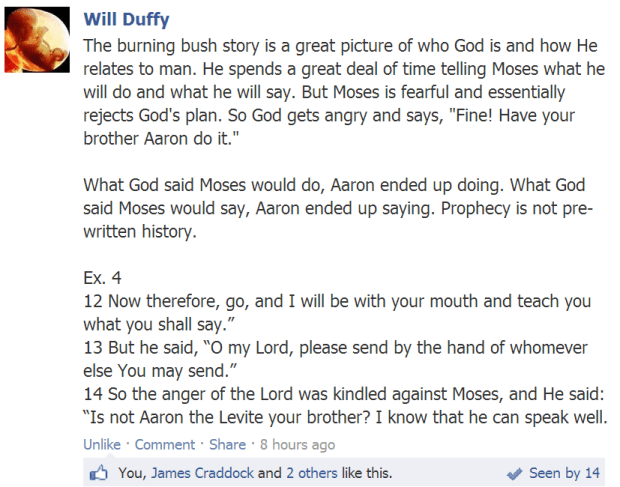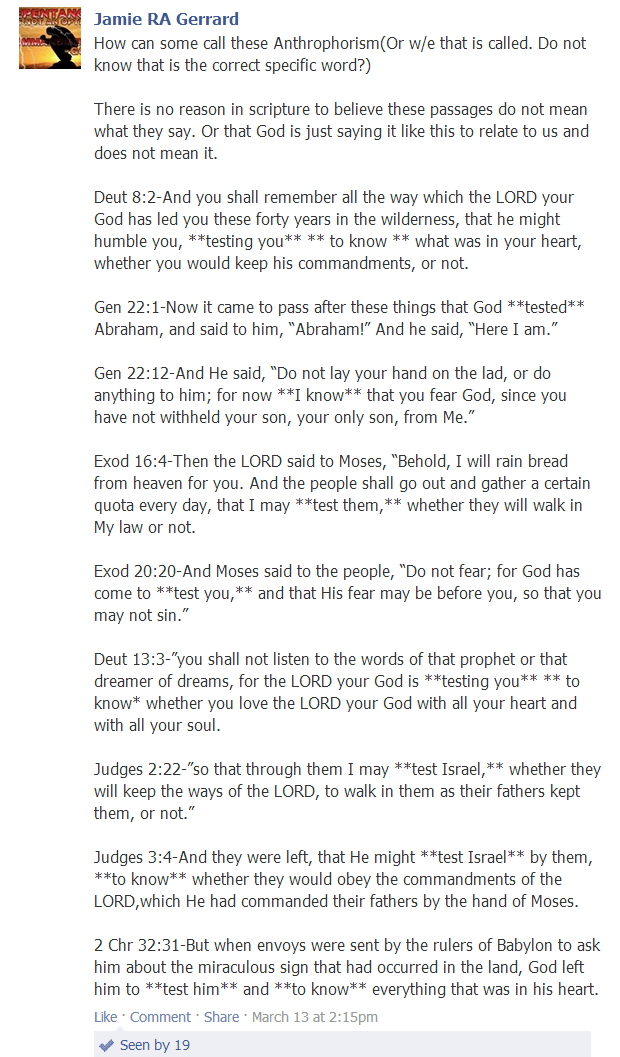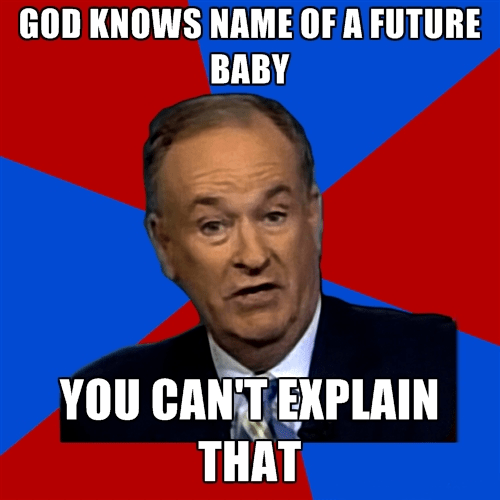Matt Slick has an article entitled “Things you might hear the God of open theism say” in which he attempts to mock God (as Open Theists view God). The problem is that Slick is mocking God. This is his mocking list which has been spliced with God actually saying an equivalent phrase or concept:
1. Ooops
God says to himself that He wishes He had not made man:
Gen 6:5 And GOD saw that the wickedness of man was great in the earth, and that every imagination of the thoughts of his heart was only evil continually.
Gen 6:6 And it repented the LORD that he had made man on the earth, and it grieved him at his heart.
Gen 6:7 And the LORD said, I will destroy man whom I have created from the face of the earth; both man, and beast, and the creeping thing, and the fowls of the air; for it repenteth me that I have made them.
2. Doh!
God kills children in an attempt to punish Israel, but the intended effect does not materialize:
Jer 2:30 “In vain I have chastened your children; They received no correction. Your sword has devoured your prophets Like a destroying lion.
3. Uh, oh.
God takes precautions against the eventuality that mankind eats from the Tree of Life:
Gen 3:22 Then the LORD God said, “Behold, the man has become like one of Us, to know good and evil. And now, lest he put out his hand and take also of the tree of life, and eat, and live forever”—
Gen 3:23 therefore the LORD God sent him out of the garden of Eden to till the ground from which he was taken.
4. Oh, no.
In Jeremiah 18, God outlines His basic operating procedures. Sometimes God expects a nation to be righteous. God then promises them blessings and prosperity. But sometimes these nations turn from Him, and as a response, God revokes His promises to them.
Jer 18:9 And at what instant I shall speak concerning a nation, and concerning a kingdom, to build and to plant it;
Jer 18:10 If it do evil in my sight, that it obey not my voice, then I will repent of the good, wherewith I said I would benefit them.
5. Dang it!
God thinks Israel would return to Him, but Israel refuses.
Jer 3:7 And I said, after she had done all these things, ‘Return to Me.’ But she did not return. And her treacherous sister Judah saw it.
6. Shucks!
God’s will is rejected to mankind’s own detriment.
Luk 7:30 But the Pharisees and lawyers rejected the will of God for themselves, not having been baptized by him.
7. Let me get back to you on that.
God endures Israel for a long time and then God promises to exact vengeance in the future.
Num 14:27 “How long shall I bear with this evil congregation who complain against Me? I have heard the complaints which the children of Israel make against Me.
Num 14:28 Say to them, ‘As I live,’ says the LORD, ‘just as you have spoken in My hearing, so I will do to you:
Num 14:29 The carcasses of you who have complained against Me shall fall in this wilderness, all of you who were numbered, according to your entire number, from twenty years old and above.
8. Wow, that was a surprise.
God says it never even entered His mind that people would literally burn their children to death.
Jer 19:5 They have built also the high places of Baal, to burn their sons with fire for burnt offerings unto Baal, which I commanded not, nor spake it, neither came it into my mind:
9. I hope it works out.
In Jeremiah, God wants Jeremiah’s message to work.
Jer 26:3 Perhaps everyone will listen and turn from his evil way, that I may relent concerning the calamity which I purpose to bring on them because of the evil of their doings.’
But the people do not listen and repent.
10. Oh no, now what is he going to do this time?
In Deuteronomy 30, God warns Israel that He is going to destroy them and then gives them two options: life or death. Each is confidently spoken as being possible. The only reasons to convince someone of something is if they are not already set on a particular action.
Deu 30:18 I denounce unto you this day, that ye shall surely perish, and that ye shall not prolong your days upon the land, whither thou passest over Jordan to go to possess it.
Deu 30:19 I call heaven and earth to record this day against you, that I have set before you life and death, blessing and cursing: therefore choose life, that both thou and thy seed may live:
11. No, I haven’t heard the joke about the open theist.
God goes to Sodom to verify reports and states that He will learn the truth.
Gen 18:21 I will go down now and see whether they have done altogether according to the outcry against it that has come to Me; and if not, I will know.”
12. Please, oh please, please, please believe in me.
God laments that He has shown Israel countless miracles and yet they reject Him. This is seriously the theme of much of the Old Testament:
Num 14:11 Then the LORD said to Moses: “How long will these people reject Me? And how long will they not believe Me, with all the signs which I have performed among them?
13. I’ll not do that again.
God states that He will not again destroy man, and God uses the exact same reason that He destroyed them in the first place. God is saying, under the same criteria, my actions will be different.
Gen 8:21 And the LORD smelled a soothing aroma. Then the LORD said in His heart, “I will never again curse the ground for man’s sake, although the imagination of man’s heart is evil from his youth; nor will I again destroy every living thing as I have done.
14. That didn’t turn out to well, did it?
God worked tirelessly to make Israel accept Him, but they rejected Him against what He expected.
Isa 5:4 What more could have been done to My vineyard That I have not done in it? Why then, when I expected it to bring forth good grapes, Did it bring forth wild grapes?
…
Isa 5:7 For the vineyard of the LORD of hosts is the house of Israel, And the men of Judah are His pleasant plant. He looked for justice, but behold, oppression; For righteousness, but behold, a cry for help.
15. I’ll try and get it right next time.
God offers Moses a Plan B to reset His promise to Israel. This is a divine mulligan.
Exo 32:9 And the LORD said to Moses, “I have seen this people, and indeed it is a stiff-necked people!
Exo 32:10 Now therefore, let Me alone, that My wrath may burn hot against them and I may consume them. And I will make of you a great nation.”
16. I’d answer your prayer but I don’t know what is going to happen.
God does answer Moses’ prayer to spare Israel, and interestingly enough God finds Himself in the exact same position wanting to destroy Israel in Numbers 14. God’s answer to Moses’ prayer did not turn out well, in Numbers 14 God answers Moses’ prayer again knowing full well the history of answering this specific prayer.
Exo 32:11 Then Moses pleaded with the LORD his God, and said: “LORD, why does Your wrath burn hot against Your people whom You have brought out of the land of Egypt with great power and with a mighty hand?
Exo 32:12 Why should the Egyptians speak, and say, ‘He brought them out to harm them, to kill them in the mountains, and to consume them from the face of the earth’? Turn from Your fierce wrath, and relent from this harm to Your people.
Exo 32:13 Remember Abraham, Isaac, and Israel, Your servants, to whom You swore by Your own self, and said to them, ‘I will multiply your descendants as the stars of heaven; and all this land that I have spoken of I give to your descendants, and they shall inherit it forever.’ ”
Exo 32:14 So the LORD relented from the harm which He said He would do to His people.
17. Hey, I just learned something.
God says that He tested Abraham (throughout the Bible God tests people) and then learned what Abraham would do in a compromising situation.
Gen 22:12 And He said, “Do not lay your hand on the lad, or do anything to him; for now I know that you fear God, since you have not withheld your son, your only son, from Me.”
18. Well, I can always go to plan B.
God tells Saul that the original plan was for Saul’s Kingdom to last forever. But God changes that plan based on Saul’s actions. God replaces this with a Plan B that David would be King.
1Sa 13:13 And Samuel said to Saul, “You have done foolishly. You have not kept the commandment of the LORD your God, which He commanded you. For now the LORD would have established your kingdom over Israel forever.
1Sa 13:14 But now your kingdom shall not continue. The LORD has sought for Himself a man after His own heart, and the LORD has commanded him to be commander over His people, because you have not kept what the LORD commanded you.”
19. Well, I can always go to plan B,C,D,E, F
In Exodus 3-4, God sets up a series of contingency plans for Moses. God prefaces the entire plan by saying He is positive that Pharaoh will not just let the people go. A strange thing for the classical understanding of omniscience:
Exo 3:19 But I am sure that the king of Egypt will not let you go, no, not even by a mighty hand.
God then gives Moses cascading conditional plan to convince Israel which God also states He will use against Pharaoh:
Exo 4:3 And He said, “Cast it on the ground.” So he cast it on the ground, and it became a serpent; and Moses fled from it.
Exo 4:4 Then the LORD said to Moses, “Reach out your hand and take it by the tail” (and he reached out his hand and caught it, and it became a rod in his hand),
Exo 4:5 “that they may believe that the LORD God of their fathers, the God of Abraham, the God of Isaac, and the God of Jacob, has appeared to you.”
Exo 4:6 Furthermore the LORD said to him, “Now put your hand in your bosom.” And he put his hand in his bosom, and when he took it out, behold, his hand was leprous, like snow.
Exo 4:7 And He said, “Put your hand in your bosom again.” So he put his hand in his bosom again, and drew it out of his bosom, and behold, it was restored like his other flesh.
Exo 4:8 “Then it will be, if they do not believe you, nor heed the message of the first sign, that they may believe the message of the latter sign.
Notice the “if they do not believe”. God then goes ahead and says that they will believe the second sign. God is saying the further miracles might not be necessary, but on the case that they are Moses was to do further signs. But God is not positive, so He adds more contingencies, just in case:
Exo 4:9 And it shall be, if they do not believe even these two signs, or listen to your voice, that you shall take water from the river and pour it on the dry land. The water which you take from the river will become blood on the dry land.”
God adds one more contingency plan: killing Pharaoh’s son:
Exo 4:22 Then you shall say to Pharaoh, ‘Thus says the LORD: “Israel is My son, My firstborn.
Exo 4:23 So I say to you, let My son go that he may serve Me. But if you refuse to let him go, indeed I will kill your son, your firstborn.” ‘ ”
Of course, this did not work either, so God used a cascading series of supplemental plagues to break Pharaoh’s spirit. Here is a breakdown:
So, God tells Moses: Show the rod to a snake, Show your hand turning white, take a jar of water from the river and show it turning to blood, tell Pharaoh that his son will die.
What happened: Moses showed the rod turning into a snake. Moses skips the hand turning white. Moses turned the entire river into blood, as opposed to a jar being poured onto dry land (God was upping the ante), Moses brought frogs, then lice, then flies, kills livestock, brings boils, then hail, then locusts, then darkness, then all of Egypt loses their firstborn (not just Pharaoh).
Even God’s express plans are open for modification on the fly.
19. Well, I can always go to plan B,C,D,E, F (Part 2)
Abraham discusses with God a complex hypothetical, convincing God not to destroy Sodom for an increasingly lower number of people, changing God’s plans on the fly.
Gen 18:24 Suppose there were fifty righteous within the city; would You also destroy the place and not spare it for the fifty righteous that were in it?
Gen 18:25 Far be it from You to do such a thing as this, to slay the righteous with the wicked, so that the righteous should be as the wicked; far be it from You! Shall not the Judge of all the earth do right?”
Gen 18:26 So the LORD said, “If I find in Sodom fifty righteous within the city, then I will spare all the place for their sakes.”
Gen 18:27 Then Abraham answered and said, “Indeed now, I who am but dust and ashes have taken it upon myself to speak to the Lord:
Gen 18:28 Suppose there were five less than the fifty righteous; would You destroy all of the city for lack of five?” So He said, “If I find there forty-five, I will not destroy it.”
Gen 18:29 And he spoke to Him yet again and said, “Suppose there should be forty found there?” So He said, “I will not do it for the sake of forty.”
Gen 18:30 Then he said, “Let not the Lord be angry, and I will speak: Suppose thirty should be found there?” So He said, “I will not do it if I find thirty there.”
Gen 18:31 And he said, “Indeed now, I have taken it upon myself to speak to the Lord: Suppose twenty should be found there?” So He said, “I will not destroy it for the sake of twenty.”
Gen 18:32 Then he said, “Let not the Lord be angry, and I will speak but once more: Suppose ten should be found there?” And He said, “I will not destroy it for the sake of ten.”
Matt Slick thinks he is being funny or cute, but he is mocking God.
Gal 6:7 Do not be deceived, God is not mocked; for whatever a man sows, that he will also reap.
May the Lord repay him according to his works.









